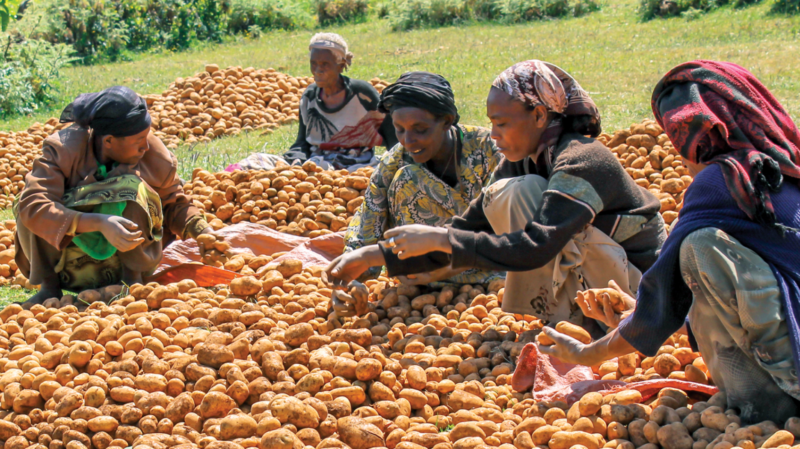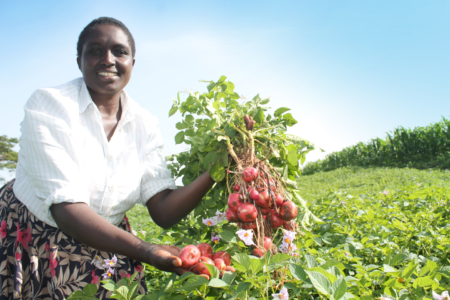
The Seeds of change project supports the large-scale adoption of climatesmart potato technologies and practices in Ethiopia, strengthening farmer access to improved varieties.
Background
Climate change is projected to increase temperatures and the variability of rainfall in Ethiopia—a threat to the already vulnerable livelihoods of millions of potato farming households and other stakeholders in the value chain. The use of improved varieties, and existing technologies and practices could help smallholders adapt to a changing climate while improving yields and reducing dependence on expensive inputs. Smallholders face multiple barriers, however, that prevent their awareness of, access to and uptake of these resources. The Seeds of change project implemented by International Potato Center (CIP) offers a set of strategic interventions to bring about the largescale adoption of climate-smart potato technologies and practices, supporting smallholder producers in Ethiopia to enjoy their benefits equitably.
Objectives
The project purpose is to strengthen farmer access to potato varieties of improved resilience, and to support national research institutes’ capacity for continued demand-driven varietal development, adaptation and dissemination, through a responsive and sustainable seed production and distribution network. The project will strengthen potato innovation systems to facilitate farmers’
equitable and sustainable access through:
- sustainable local supply of a broad range of climatesmart and disease-resistant varieties;
- increased efficiency in early-generation potato seed production;
- improved capacity of decentralized farmer seed group cooperatives in high-quality seed production;
- validated technologies to increase potato productivity scaled out to resource-poor smallholder farmers;
- the mainstreaming of gender-sensitive methods for access to technologies and knowledge; and
- strengthened potato innovation systems and partnerships.
Approach
Improved supply of climate-smart and disease-resistant varieties will be achieved by supporting the ability of national agricultural research systems to undertake participatory variety selection process to facilitate production of desired varieties. This will bring genetic gains to farmers by replacing varieties no longer resistant to disease and unable to tolerate abiotic stress. Among the activities within this approach will be the generation of data to support the formal release of at least four new potato varieties, the seed bulking of preferred clones for distribution to farmer seed cooperatives, and feedback collection and analysis to determine the demand for preferred varieties, taking gender preferences into account.
To ensure that recently released advanced varieties are reproduced at the speed and volume needed to support farming households and accelerate their dissemination, the project will address recurrent bottlenecks in earlygeneration seed production. This will be achieved mainly by training, for example, to develop a curriculum that builds capacity for rapid multiplication technologies and increases the involvement of private-sector seed producers.
Improving the capacity of decentralized farmer seed group cooperatives in high-quality seed production will be achieved by improving links between cooperatives and early-generation seed producers. There will be business and technical training, for example in bacterial wilt containment, and capacity-building of quality declared seed inspectors to apply standards and protocols. Participatory monitoring, evaluation and learning will assess the cost-effectiveness of decentralized seed multiplier business models.
To scale up potato productivity with validated technologies to resource-poor smallholder farmers, links will be made to enable them to access improved varieties. They will be able to maintain seed quality on their farms through, among other topics, training in good agricultural practices, disease management and storage.
Gender-responsive methods for access to technologies and knowledge will be mainstreamed. Partners will develop gender-responsive project plans, and gender preferences will be monitored closely during technology piloting.
Finally, to strengthen innovation and partnerships in potato production systems, the limited coordination among stakeholders will be addressed. Periodic participatory workshops will be organized, for example, to identify and engage partners from research, business, extension and development sectors, and project partners will implement outreach activities, including participation in trade fairs.
Expected outcomes
Ensuring that 30% of beneficiaries are women, the project expects that 30,000 households will access high-quality seeds of improved varieties, 10,000 will adopt better practices, and yields will rise from 30-50%.
More than 20 clones will be evaluated with participation of at least 150 farmers, of whom over half will be women. At least four clones with preferred characteristics will be released as varieties, and 120,000 mini-tubers will be provided to farmer seed cooperatives. Forty cooperatives will have the capacity to produce, store and sell at least 4,000 additional tons of disease-free seed a year.
Some 500 farmers, seed producers, traders and processors will give feedback on the performance of the varieties. Development agents will train 40,000 farmers through the project. Activities to strengthen the potato sector will include the development of at least three
policies and at least 20 linkages established between value chain actors.
Key outcomes
| N° | |
| Households with access to high-quality seeds (HQS) of improved varieties. | 30,000 (≥30% female) |
| Adoption of better practices by farming households | 10,000 (≥30% female) |
| Increased yields through adoption of high-quality seeds of improved varieties and good practices | Increase yield by 50% (≥30% female) |
| Participatory selection with 150 farmers (50% female) | 4 clones/varieties released |
| Feedback on variety performance | 500 farmers, seed producers, traders and processors |
| Mini-tubers given to farmer seed group cooperatives | 120,000 |
| Market linkages between key actors made across the potato value chain | 20 linkages made |
| Policies developed to strengthen the sector | 3 policies developed |
Contact
Kakuhenzire Rogers
CIP, Ethiopia
r.kakuhenzire@cgiar.org
Thanks to our donors



